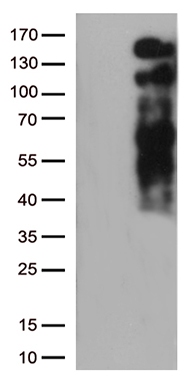LDL Receptor (LDLR) Mouse Monoclonal Antibody [Clone ID: OTI7C5]
CAT#: TA812510
LDLR mouse monoclonal antibody,clone OTI7C5
Size: 30 ul
Formulation: Carrier-Free
View other "OTI7C5" antibodies (4)
Need it in bulk or conjugated?
Get a free quote
CNY 1,999.00
CNY 2,700.00
CNY 300.00
CNY 1,430.00
CNY 2,900.00
CNY 6,650.00
Specifications
| Product Data | |
| Clone Name | OTI7C5 |
| Applications | FC, WB |
| Recommend Dilution | WB 1:500~2000, FLOW 1:100 |
| Reactivity | Human |
| Host | Mouse |
| Clonality | Monoclonal |
| Immunogen | Full length human recombinant protein of human LDLR (NP_000518) produced in HEK293T cell. |
| Formulation | PBS (pH 7.3) containing 1% BSA, 50% glycerol and 0.02% sodium azide. |
| Concentration | 1 mg/ml |
| Purification | Purified from mouse ascites fluids or tissue culture supernatant by affinity chromatography (protein A/G) |
| Conjugation | Unconjugated |
| Storage Condition | Store at -20°C as received. |
| Predicted Protein Size | 95.38 kDa |
| Gene Name | low density lipoprotein receptor |
| Database Link | |
| Background | The low density lipoprotein receptor (LDLR) gene family consists of cell surface proteins involved in receptor-mediated endocytosis of specific ligands. Low density lipoprotein (LDL) is normally bound at the cell membrane and taken into the cell ending up in lysosomes where the protein is degraded and the cholesterol is made available for repression of microsomal enzyme 3-hydroxy-3-methylglutaryl coenzyme A (HMG CoA) reductase, the rate-limiting step in cholesterol synthesis. At the same time, a reciprocal stimulation of cholesterol ester synthesis takes place. Mutations in this gene cause the autosomal dominant disorder, familial hypercholesterolemia. Alternate splicing results in multiple transcript variants. [provided by RefSeq, Sep 2010] |
| Synonyms | FH; FHC; FHCL1; LDLCQ2 |
| Reference Data | |
| Protein Families | Druggable Genome, ES Cell Differentiation/IPS, Transmembrane |
| Protein Pathways | Endocytosis |
Documents
| Product Manuals |
| FAQs |
| SDS |
Resources
| 抗体相关资料 |
Other Versions
| SKU | Description | Size | Price |
|---|---|---|---|
| CF812510 | Carrier-free (BSA/glycerol-free) LDLR mouse monoclonal antibody,clone OTI7C5 |
CNY 3,999.00 |
|
| TA812510AM | LDLR mouse monoclonal antibody,clone OTI7C5, Biotinylated |
CNY 3,990.00 |
|
| TA812510BM | LDLR mouse monoclonal antibody,clone OTI7C5, HRP conjugated |
CNY 3,990.00 |
|
| TA812510S | LDLR mouse monoclonal antibody,clone OTI7C5 |
CNY 800.00 |
其它LDL Receptor产品


 United States
United States
 Germany
Germany
 Japan
Japan
 United Kingdom
United Kingdom
 China
China




